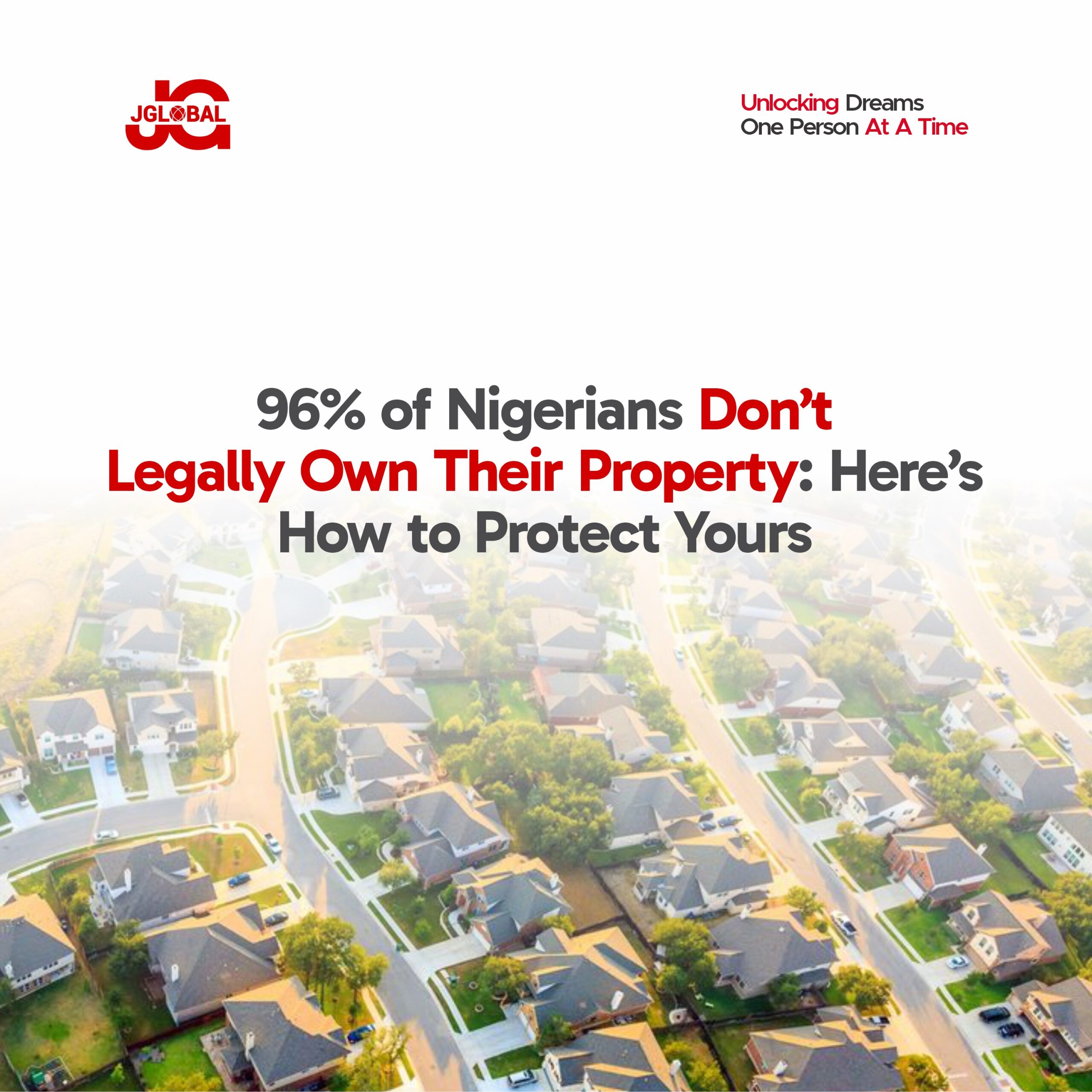96% of Nigerians Don’t Legally Own Their Property: Here’s How to Protect Yours

Introduction
Did you know that 96% of Nigerians live on land that isn’t legally recognized by the government?
That’s not a random number, it was recently revealed by the Minister of Housing and Urban Development, Arch. Ahmed Dangiwa. According to him, most of the land in Nigeria is what experts call “untitled land”, meaning it has no official government records, documents, or legal recognition.
If your land isn’t legally titled, you may not truly “own” it, at least not in a way that protects you under the law.
Especially considering how expensive land and property have become across cities like Lagos, Abuja, Port Harcourt, and even in upcoming areas like Epe and Ibeju-Lekki.
This problem of untitled land in Nigeria isn’t just a legal formality. It affects your ability to:
- Use your land as collateral for a loan
- Resell the property with confidence
- Get full government protection against land disputes
- And in some cases, retain ownership if a dispute or government project arises
Unfortunately, this is how a lot of real estate scams happen. People buy land that the government doesn’t even recognize, sometimes the same plot is sold to multiple buyers.
So the big question now is this:
- How can you know if the land you bought (or want to buy) is legally safe?
- What steps can you take to protect your investment before it’s too late?
That’s exactly what we’re going to break down in this blog, how to avoid the trap of untitled land in Nigeria, and the steps you need to secure your land or property the right way.
What Does Untitled Land Mean?
Owning untitled land in Nigeria is like holding a car key without the vehicle documents. You may be driving it, but legally, you don’t have proof that it’s truly yours.
When land is untitled, it simply means that the government does not officially recognize you as the owner. So, even if you bought it, fenced it, or even built a house on it, if you don’t have registered documents (like a Certificate of Occupancy or Governor’s Consent), your claim can be challenged.
So, What Documents Actually Count?
These are the most recognized legal land documents in Nigeria:
- Certificate of Occupancy (C of O): Issued by the government to confirm legal ownership of land.
- Governor’s Consent: Required when a titled land is transferred or sold to a new owner.
- Survey Plan: This helps identify the exact location and boundaries of your land. While it’s not a title, it’s a critical document that supports proper documentation and verification.
- Registered Deed of Assignment: This shows that the property was legally transferred to you and is recorded with the state.
If your land doesn’t have any of these, and you haven’t confirmed it through the right government channels, then it’s considered untitled land.
This is a huge risk because the land can:
- Be revoked by the government for public use
- Be resold by the original family or community (especially if there’s no formal transfer)
- Be caught in legal disputes, especially in states with overlapping land claims
- You might not even be able to sell it or use it as collateral because banks won’t touch a property that isn’t legally documented.
According to a Punch Nigeria report, land title issues are one of the top reasons why Nigeria’s real estate sector struggles to attract large-scale investment.
Now, don’t panic if you own land but haven’t sorted all these yet. The good news is, you can still secure your property legally and we’ll get into how shortly.
How to Protect Your Land (and Yourself) in Nigeria
Now that we’ve seen how risky untitled land in Nigeria can be, let’s talk solutions. If you’ve already bought land or you’re planning to invest, the good news is, you can still secure it properly.
And no, you don’t need to be a land expert. You just need to know what to check and who to ask for help.
- Start With a Title Search at the Land Registry
Every state in Nigeria has a land registry, that’s where official records are kept. Before buying land, or to verify the one you already bought, visit the registry and request a search. This helps you confirm:
- Who the legal owner is
- Whether the land has a valid title (like a C of O)
- If there are any court cases or government issues tied to it
You can go in person, or use online platforms like the Lagos State Land Bureau through their Online Land Search Portal. But, it is advisable you work with a professional because they know what to do and where to look.
- Verify the Survey Plan
A lot of people skip this step, but it’s very important. Every legitimate piece of land should have a survey plan, this shows the size, location, and whether the land falls under government acquisition.
To be sure, take the survey number to the office of the Surveyor-General in your state. They can confirm if it’s authentic, and whether the land is free from acquisition.
If it’s under acquisition, you’ll need to process a ratification (aka “regularization”) or walk away from the deal.
A comprehensive guide to survey plans
- Don’t Skip the Governor’s Consent
If you’re buying land that already has a C of O (maybe the seller got it years ago), the next step is to obtain Governor’s Consent to reflect your name as the new owner. Without it, the transaction is incomplete, and that puts your ownership at risk.
Learn more from this Governor’s Consent breakdown by Jglobalproperties.
- Hire a Real Estate Lawyer
This one might seem like an extra cost, but it’s cheaper than court fees or losing your land. A qualified real estate lawyer will help you:
- Conduct a full title and litigation check
- Draft or verify the Deed of Assignment
- Ensure proper registration of all documents
Tip: Avoid “general practice” lawyers. Go for one that specializes in property law.
- Check with the Community (and Neighbours)
Yes, it sounds old-school, but it works. Before making payments, talk to people who live around the land. Ask if they know the seller, or if they’ve heard of any ownership conflicts. In many rural or family lands, this is your first line of defense.
- Secure and Register Your Documents
Once everything checks out, make sure you register your Deed of Assignment or C of O at the land registry. That’s what makes your ownership official in the eyes of the law.
You can also back it up with a digital copy using secure platforms. Some startups like TitleSpace and PropVat are working to digitize land records in Nigeria worth exploring if you’re tech-savvy.
- Work With a Reputable Real Estate Company or Agent
Sometimes, the best way to avoid land problems is to let the pros handle it. A trusted real estate agent or company can help you find verified properties, guide you through the right documents, and spot red flags you might miss. Just make sure they’re legit, ask for references, check if they’re registered, and don’t fall for anyone rushing you to pay. A good agent saves you stress and protects your money.
- Work With a Registered Surveyor
Before you get too excited about the land, make sure you work with a registered surveyor. Their job is to visit the site and pick the land’s coordinates. Then they check if those coordinates match what’s on the document you’re being shown.
If everything tallies, that’s a good sign, it means you’re looking at the right land. From there, you can go ahead and do the rest of the verification at the land registry.
It’s a small step, but it can save you from a big mistake.
Conclusion: Are Legal Land Titles Worth It?
Owning land in Nigeria without a legal title is like building a house on shifting sand. It might stand for a while but one storm (or court case) can wipe everything out.
Yes, getting a Certificate of Occupancy, Governor’s Consent, or verifying land through the registry can take time and money. But compared to losing your entire investment or being dragged into a legal mess, it’s a small price to pay.
And most importantly, it puts you in the 4% of Nigerians who actually own their land legally. That’s not just status, it’s power.
If you’re unsure about the title of your land or property, don’t wait. Speak to a real estate professional, or request a professional document review. It’s one move that can save you from years of regret.
Want to learn more?
Grab our Free ebook on Understanding land titles in Lagos to guide you step-by-step.
Check out our post: The Psychology of Homeowners – Why Ownership Feels Different



